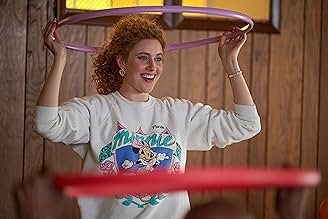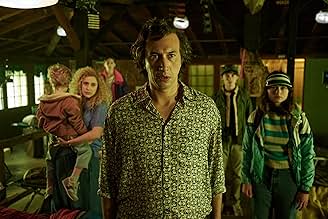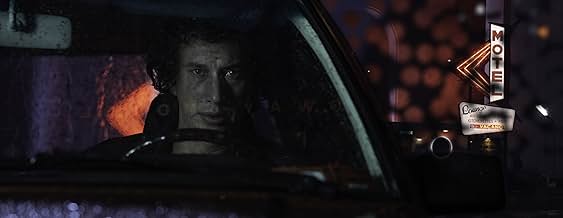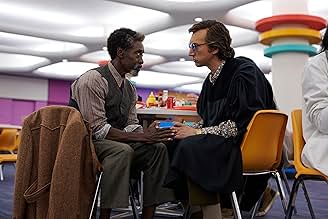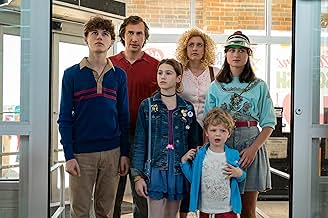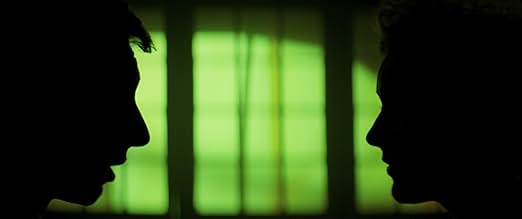PUNTUACIÓN EN IMDb
5,7/10
47 mil
TU PUNTUACIÓN
Dramatiza los intentos de una familia estadounidense contemporánea de lidiar con los conflictos de la vida mientras se enfrenta a los misterios universales del amor, la muerte y la posibilid... Leer todoDramatiza los intentos de una familia estadounidense contemporánea de lidiar con los conflictos de la vida mientras se enfrenta a los misterios universales del amor, la muerte y la posibilidad de la felicidad en un mundo incierto.Dramatiza los intentos de una familia estadounidense contemporánea de lidiar con los conflictos de la vida mientras se enfrenta a los misterios universales del amor, la muerte y la posibilidad de la felicidad en un mundo incierto.
- Dirección
- Guión
- Reparto principal
- Premios
- 2 premios y 25 nominaciones en total
Wickham Reeve
- College on the Hill
- (as Wickham Bermingham)
Mathew Williams
- College on the Hill
- (as Matthew Williams)
Reseñas destacadas
White Noise is, undoubtedly, the strangest movie Netflix has released this year, which is saying a lot given the competition. The plot is all over the place, the dialogue very stylized, and the overall atmosphere is engaging but off-putting. It's the type of movie that is sure to cause a lot of division in audiences.
At its core, White Noise is about a college professor named Jack and his middle class family dealing with their fear of death, but what actually happens is quite complicated. So complicated, in fact, that it feels like three separate movies smashed together. To be fair, the novel is just as ungainly and incoherent, but at least you had the sense that you were the one with the problem. There was a mystique to DeLillo's writing that made it seem like there was a lot going on thematically with the strange choices. But in the movie? It just seems like bad, pretentious writing. I'm not even sure if Baumbach knew what DeLillo's aim was, or if he just guessed.
One symptom of this is that the unnatural dialogue stick out like a sore thumb: in a scene where Jack's wife, Babette, says how open she is with communicating her feelings, Driver says "That is the point of Babette." In another moment, Jack is shopping with his coworker when said coworker suddenly says that Jack's wife's "hair looks important." What is the point of lines like this? Because all it accomplishes is taking you out of the moment and reminding you that you're watching a movie with a script. Not to mention the multiple long, unintelligible "philosophical" monologues that occasionally pop up. Is it an intentional commentary on the hollowness of academia? If so, then why are they presented so uncritically and played dead straight? It's just another disjointed element of the movie that seems unfinished.
But even if the script fails them, the cast and tech crew don't give up on trying. Driver and Gerwig give very different performances, the former acting almost like an intentional caricature of a sitcom dad, and the latter trying to be serious the whole time. And yet it's one of the few disparate combinations in the film that actually pays off: their acting is convincing as a real couple. Gerwig, in particular, brings emotion to scenes that were completely absent of it on the page. The production design and score are also on point, creating a distinct and interesting atmosphere that also furthers the film's supposed social commentary. But none of this is quite enough to save White Noise from itself and its shortcomings.
The best part of the film is far and away the end credits. I'm not saying that as some sort of flippant joke about the movie's quality, it's a genuinely incredible sequence. Somehow it captures the exact type of weirdness and existentialism and fun that's absent from the rest of the movie. It's so good that, in all honesty, you could probably skip the rest of the movie for it. White Noise is consistently watchable and unique, unlike anything else you'll see this year. But it's aimless, confused, and ultimately baffling to make any significant impact.
Final Score: 62/100.
At its core, White Noise is about a college professor named Jack and his middle class family dealing with their fear of death, but what actually happens is quite complicated. So complicated, in fact, that it feels like three separate movies smashed together. To be fair, the novel is just as ungainly and incoherent, but at least you had the sense that you were the one with the problem. There was a mystique to DeLillo's writing that made it seem like there was a lot going on thematically with the strange choices. But in the movie? It just seems like bad, pretentious writing. I'm not even sure if Baumbach knew what DeLillo's aim was, or if he just guessed.
One symptom of this is that the unnatural dialogue stick out like a sore thumb: in a scene where Jack's wife, Babette, says how open she is with communicating her feelings, Driver says "That is the point of Babette." In another moment, Jack is shopping with his coworker when said coworker suddenly says that Jack's wife's "hair looks important." What is the point of lines like this? Because all it accomplishes is taking you out of the moment and reminding you that you're watching a movie with a script. Not to mention the multiple long, unintelligible "philosophical" monologues that occasionally pop up. Is it an intentional commentary on the hollowness of academia? If so, then why are they presented so uncritically and played dead straight? It's just another disjointed element of the movie that seems unfinished.
But even if the script fails them, the cast and tech crew don't give up on trying. Driver and Gerwig give very different performances, the former acting almost like an intentional caricature of a sitcom dad, and the latter trying to be serious the whole time. And yet it's one of the few disparate combinations in the film that actually pays off: their acting is convincing as a real couple. Gerwig, in particular, brings emotion to scenes that were completely absent of it on the page. The production design and score are also on point, creating a distinct and interesting atmosphere that also furthers the film's supposed social commentary. But none of this is quite enough to save White Noise from itself and its shortcomings.
The best part of the film is far and away the end credits. I'm not saying that as some sort of flippant joke about the movie's quality, it's a genuinely incredible sequence. Somehow it captures the exact type of weirdness and existentialism and fun that's absent from the rest of the movie. It's so good that, in all honesty, you could probably skip the rest of the movie for it. White Noise is consistently watchable and unique, unlike anything else you'll see this year. But it's aimless, confused, and ultimately baffling to make any significant impact.
Final Score: 62/100.
What exactly does this film want to achieve? Why should the weird and sometimes paranoid look or angle of a director or script writer be something worth mentioning, let alone made into a movie? I honestly tried to see this movie with as clear a mind as I can... Is there something wrong with me? Is there some secret dimension hidden in this film that I (40 years old) can't grasp? Where is the director looking forward to? Amuse us? Entertain us? Drive us crazy? The last one, he succeeded! What did I watch? A strange, motley family whose members' dialogues use pretentious expressions full of disjointed, meaningless words and a tendency to impress even the teenagers of the family with their knowledge and strange inclinations! Do us a favor... We are not so easy to get. 1/10 from me.
Most of the reviews that I have read thus far were negative, or a bit overly kind. The low rating is likely due to people going out for a light story, expecting to see a disaster action flick or end of the world comedy. This is essentially a reflection on mans fear of his own mortality, or perhaps more specifically on a certain subcultures fixation on their own impending end. If you take the movie as a series of reflections on that idea, and most of the characters as representations of certain personality types, perspectives and ideologies, then it all makes a lot of sense. And, it is pretty damn (darkly) funny as well. Enjoy.
For the first hour of White Noise, I found myself very entertained. But for the second half I found myself incredibly bored. They felt like two separate films. If the first half had just been the whole film. I probably would have have given this film an 8. Or possibly a 9. It goes from being an apocalyptic family satire, to a revenge tale. I believe Noah Baumbach didn't even know what exactly he was going for. White Noise was average. The two aspects holding me back from giving it a 4 are again the first half and another stellar performance from Adam Driver. Nowhere near as good as Marriage Story. Then again they are very different films.
This film has some hilarious one liners and twisted distortions of reality. The first act had me so intrigued I was gripped. Then I was confused. Then I couldn't decide if it was a comedy intentionally or not.
The reality is this film doesn't quite know what it is, and if you think it's going to go somewhere or wrap anything up at the end then you are dead wrong.
Weird for weirds sake is the name of the game. Think of a psychedelic trip by someone who likes the smell of their own farts and decided to write it down.
A future cult classic in the making and I'm sure many people will revere this film for years to come; rewatching it for it's one liners and oddities. For me however one baffling, confusing watch is enough to last a lifetime.
The reality is this film doesn't quite know what it is, and if you think it's going to go somewhere or wrap anything up at the end then you are dead wrong.
Weird for weirds sake is the name of the game. Think of a psychedelic trip by someone who likes the smell of their own farts and decided to write it down.
A future cult classic in the making and I'm sure many people will revere this film for years to come; rewatching it for it's one liners and oddities. For me however one baffling, confusing watch is enough to last a lifetime.
¿Sabías que...?
- CuriosidadesThis is Noah Baumbach's first time writing and directing a book-to-screen adaptation, and only his second adaptation after co-writing the screenplay for Fantástico Sr. Fox (2009).
- PifiasIn the opening scene, many vehicles featured in Murray's crash sequence reel are from the 1990s and 2000s, whereas White Noise takes place in the 1980s.
- Créditos adicionalesThere is a scene at the end where the characters dance in a supermarket. As the credits start to roll, this sequence is played partially in reverse as the music continues to play normally.
- Banda sonoraLincoln Portrait
Written by Aaron Copland
Selecciones populares
Inicia sesión para calificar y añadir a tu lista para recibir recomendaciones personalizadas
- How long is White Noise?Con tecnología de Alexa
Detalles
- Fecha de lanzamiento
- Países de origen
- Sitio oficial
- Idiomas
- Títulos en diferentes países
- Ruido De Fondo
- Localizaciones del rodaje
- Wellington, Ohio, Estados Unidos(Storefronts are built out and set up for July filming)
- Empresas productoras
- Ver más compañías en los créditos en IMDbPro
Taquilla
- Presupuesto
- 145.000.000 US$ (estimación)
- Recaudación en todo el mundo
- 71.728 US$
- Duración2 horas 16 minutos
- Color
- Relación de aspecto
- 2.39 : 1
Contribuir a esta página
Sugerir un cambio o añadir el contenido que falta



